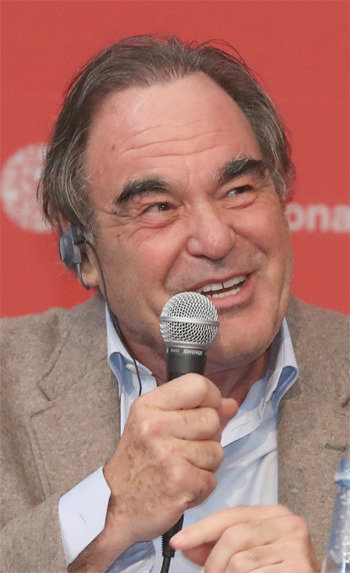‘Films can help bring the détente on Korea,’ says Oliver Stone
‘Films can help bring the détente on Korea,’ says Oliver Stone
Posted October. 14, 2017 07:33,
Updated October. 14, 2017 07:58

“My wife is Korean, and my in-law family lives in Seoul. I have in-laws who experienced the Korean War, so I’ve heard a lot from them. Though tensions are currently high on the Korean Peninsula, I believe films can serve as a window to a brighter future.”
World-renowned American filmmaker Oliver Stone talked about political circumstances on the Korean Peninsula, which are remaining high due to North Korea’s nuclear development issue and South Korea’s decision to deploy the U.S. Thaad missile defense system. “As the former Soviet leader Mikhail Gorbachev met with the then U.S. President Ronald Reagan to end the Cold War, all parties concerned including South and North Korea, the United States and China need to gather together and discuss the issue,” said the 71-year-old director in a jury press conference held on Friday. He visited Korea to lead jurors for the New Currents category of the 22nd Busan International Film Festival (BIFF).
With his film “Platoon” (1986), Stone won four Academy Awards and a Silver Bear from the Berlin International Film Festival. He is known for making films that address social issues, such as “Salvador” (1986), critical of the U.S. government’s involvement in Central America; “Wall Street” (1987), which exposes America’s new capitalism; and “Snowden” (2016), a film that follows the CIA whistleblower Edward Snowden. Most recently, he directed a documentary series “The Putin Interviews” after conducting more than a dozen interviews with Russian President Vladimir Putin over a two-year period.
When asked about controversy over the festival’s “freedom of expression” stirred after the BIFF, against the Busan city’s opposition, screened “Diving Bell,” a documentary that depicts the process of the rise and fall of the special equipment used in the rescue operation of the Sewol ferry sinking, the Oscar-winning director said, “The Korean government had lots of issues regarding such types of pressure. The former Park Geun-hye administration seems to have been a ‘strong government.’ I hope pressure can now be replaced with ‘expression’ though belated.”
Stone also did not hide his deep affection for Korean films, saying, “Korean films stand out in music, design and shooting altogether.” He also added that he “admires actors and actresses who play a character that looks rather ridiculous in the beginning but becomes completely different while going through several twists in the plot,” naming Lee Byung-hun, Hyun Bin, and Choi Min-sik as Korean actors he was personally impressed with.
The legendary filmmaker also commented on the recent controversy over film producer Harvey Weinstein’s sexual misconduct allegations, saying that “(sexual harassment) cannot be justified under any systems. If you violated the law, you should be brought to justice.”
Sun-Hee Jang sun10@donga.com







